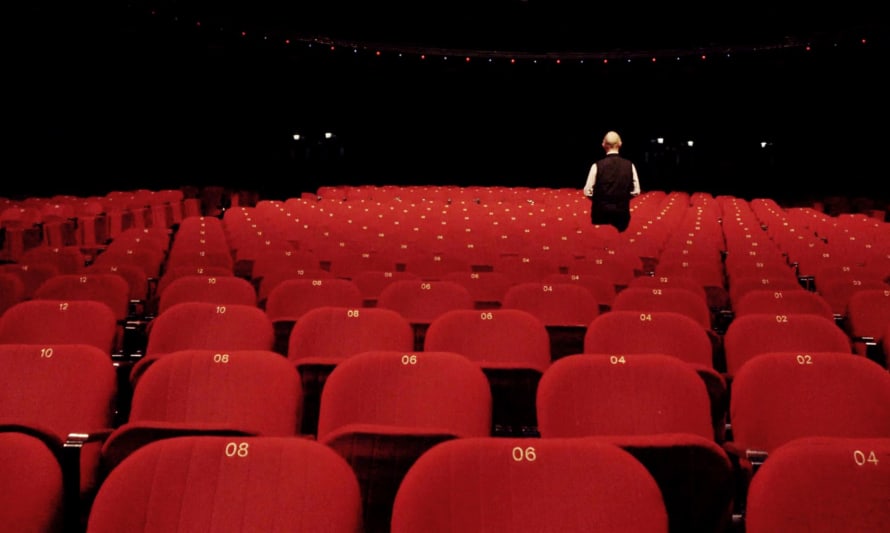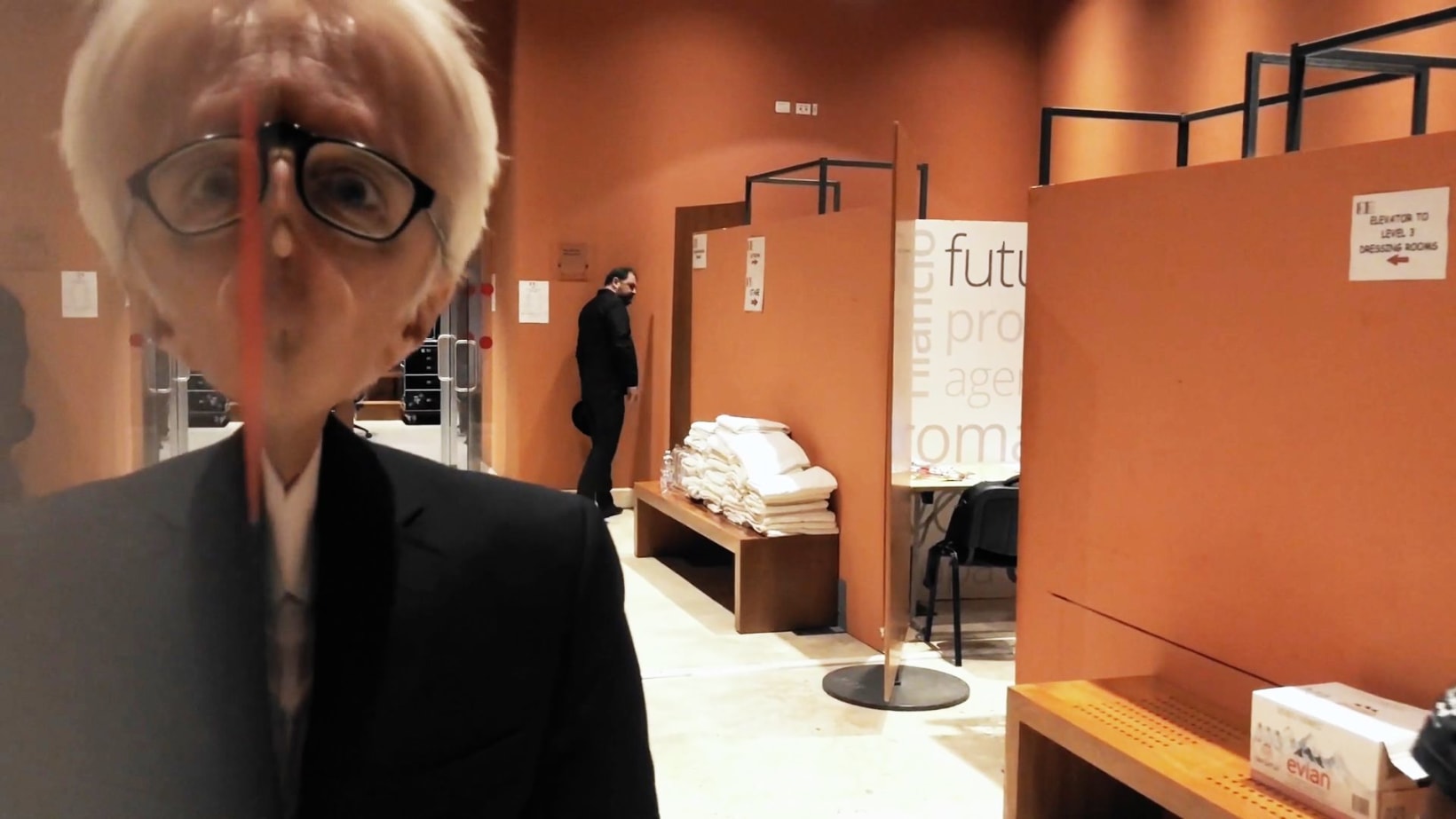
Filmwire Spotlight: In The Court of the Crimson King
Birmingham born filmmaker Toby Amies spent much of his early career working for MTV before moving back to the UK, where he directed his first feature length documentary The Man Whose Mind Exploded in 2013. His new film In The Court Of The Crimson King is a perfectly eccentric account of the band Crimson King and their complex founder Robert Fripp.
Filmwire caught up with Amies to talk about the genesis of a fascinating film that has the Midlands baked into its very essence.
So you’re a Midlands lad, then?
Yes, I was born in Birmingham, but was brought up just outside The Lenches near Evesham. I’m very proud of being from the Midlands. There’s a band called The Dancing Did who were from Evesham, and instead of complaining about how shit it was to grow up in Evesham, they decided to celebrate it. For me, that made it cool to come from there when I was young. I fucking love the accent. I slip into it when I talk to a native speaker.
So how did you end up making a film about King Crimson?
Well, I grew up very close to where Robert lives in Worcestershire, and my dad lived on the same street as Robert. So I met him through my parents, and I interviewed him for a Radio 4 doc I made. He ended up seeing my first film The Man Whose Mind Exploded and liked it very much. Robert has been asked lots of times to make a documentary about King Crimson, but he never wanted to make one of those films where – and I quote Robert here – ‘the dead have been brought forward, but they remain unburied.’ I think because I have a relatively individual style of filmmaking, he felt that I was going to make a different kind of rock documentary. I also have a sense that he looked at me and thought, ‘This guy is a mess - what would happen if we put that chaos into this very ordered and disciplined organisation?’
Is it right that you didn’t know anything about the band?
Yes, I grew up as punk was happening, so prog rock bands to me were dinosaurs. I knew Robert’s work with Brian Eno and David Bowie, but I think ignorance can work to your advantage sometimes. When I worked at MTV, I would sometimes consciously not learn too much about the band I was interviewing, just as long as you listen to them. It doesn’t really matter if you’re ignorant, because you’re in the same position as the audience. Robert wanted to not only examine what King Crimson was, but also introduce the band to people who had no idea what it was all about. If that’s part of the goal, then better for me to not know very much about them. Plus there’s no shortage of documentation about the band online, and I didn’t want to get into arguments about whose version of history was right. That’s not very exciting cinema.
What was the process of filming with Robert and the band like?
It wasn’t a lot of fun, but that’s all in the film. Having worked in show business for 30 years, there’s a battle between commerce and truth. Commerce is always telling you to say everything is great, when the truth of the matter is there’s good, there’s bad and then – and this is very much a Midlands thing – there’s an awful muddle of the two in the middle, and that’s where I find myself as a filmmaker. It’s important for the audience to see that kind of stuff. Fundamentally, the founding principle of King Crimson is that to make this extraordinary music, you’re going to have to make extraordinary sacrifices. This film asks the question – is it worth it?
Robert is a very complex character. Did you ever touch on mental health with him? I’m no psychologist. I’m interested in studying and exploring the human condition, but I’m not qualified to make any straight forward conclusions about people. I’d rather the audience make their own ‘diagnosis’ if they want. I decided fairly early on that I was going to drive myself nuts if I was trying to work out what was going on inside Robert Fripp’s brain. I was keen to show how his ideas and to a lesser extent his actions impact himself, the musicians around him and the music they make, but I decided not to peel him like an onion. I have a musician friend called Howe Gelb, and when I told him recently I’d like to make a film about him, he said, ‘Why would I want to have a film made about me?’ And I didn’t have an answer! It’s a very intrusive process, if you’re trying to make something truthful.
The end scene (which we won’t ruin here) is such a beautiful encapsulation of how perverse both the film and Robert can be. And it feels very apt coming from a Midlands filmmaker, if that makes sense?
For me, that’s probably the most important bit of the film. I actually made this film twice. Whilst I was filming the original commission, for the first year or so, Robert really wouldn’t talk to me. It got to the point where everyone but Robert had spoken to me. And it wasn’t very pleasant for me or the audience, because they felt pushed away by Robert. So it wasn’t well received, but that became the thing that allowed me to say to Robert, ‘Look, this is what the film is like without you.’ That contentious relationship remains in the second version but in a much fuller way, and as a consequence that end sequence is so important. It resets the balance in a very elegant way, because it demonstrates Robert’s wicked sense of humour. In the end moment, we share in the joke. There’s a tiny little look in his eyes, a look of recognition. That connects everything. The antagonism is dissolved in that little look. All’s well that ends well.
Did you have final cut?
King Crimson paid for the whole thing, but it’s important to stress that there was no creative interference whatsoever. Even when I said to them I needed another 50 grand to remake the film, there was a bit of grumbling, but that was it. Quite extraordinary. In fact, the only significant complaint Robert made was when one of the band members insisted on having a few bits cut out because he thought he was being too nasty about Robert, and Robert was like, ‘The nastier the better’. They’re an infuriating organisation, but they’re also brilliant. The punks told me prog rock was evil, but King Crimson are the most punk rock band I’ve ever worked with. The whole organisation exists to protect the art at the heart of it. That’s the essence of King Crimson. It’s a creative space in which you are given the necessary support and tools to make the best work you possibly can.
As a Birmingham born filmmaker, what are your thoughts on making films in the Midlands? Do people have to move to the capital to progress their career, or can it be done here?
I think if you want to be in show business, at some point you have to get your hands dirty. London is probably where you need to be for that part. However, if you want to make good work, then you need to be as far away as possible from the business – both physically and mentally. The first thing I say to young people moaning about how expensive London can be is, ‘Move to Birmingham’. It’s a fucking massive city and you can get serious industrial space for a very reasonable price. With the exception of the filming, I would say 95% of the post-production for In The Court Of The Crimson King was either done in Pershore in the Midlands or in a shed in Sussex. I couldn’t have made a film this idiosyncratic if I was sitting in an office. Make the work in an environment where there’s as little financial and political pressure as possible.
For full information about where to see In The Court Of The Crimson King, head to (https://www.itcotck.com/)
This interview featured in the latest edition of Filmwire. Sign up for the Filmwire newsletter to stay in the loop on all the latest Midlands film happenings.
